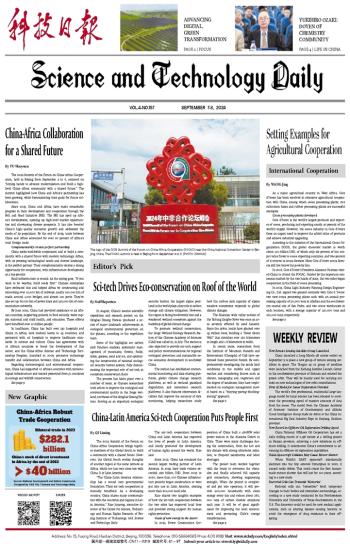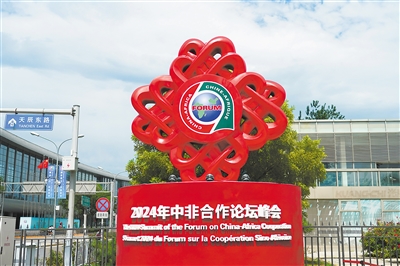
 Advancing Digital, Green Transformation
Advancing Digital, Green Transformation Yukihiro Ozaki: Doyen of Chemistry Community
Yukihiro Ozaki: Doyen of Chemistry Community China-Africa Collaboration for a Shared Future
China-Africa Collaboration for a Shared Future Setting Examples for Agricultural Cooperation
Setting Examples for Agricultural Cooperation Sci-tech Drives Eco-conservation on Roof of the World
Sci-tech Drives Eco-conservation on Roof of the World WEEKLY REVIEW
WEEKLY REVIEW New Graphic
New Graphic China-Latin America Sci-tech Cooperation Puts People First
China-Latin America Sci-tech Cooperation Puts People First
 |
| The logo of the 2024 Summit of the Forum on China-Africa Cooperation (FOCAC) near the China National Convention Center in Beijing, China. The FOCAC summit is held in Beijing from September 4 to 6. (PHOTO: XINHUA) |
The 2024 Summit of the Forum on China-Africa Cooperation, held in Beijing from September 4 to 6, centered on "Joining hands to advance modernization and build a high-level China-Africa community with a shared future." The summit highlighted how China and Africa's partnership has been growing, while demonstrating their goals for future collaboration.
Since 2013, China and Africa have made remarkable progress in their development and cooperation through the Belt and Road Initiative (BRI). The BRI has sped up Africa's development, opening up high-level market opportunities and showcasing diverse prospects. It has also boosted China's high-quality economic growth and addressed the needs of its population. By the end of 2023, trade between China and Africa accounted for over 20 percent of Africa's total foreign trade.
Complementarity creates perfect partnership
China seeks worldwide cooperation and to build a community with a shared future with modern technology. Africa, with its pressing technological needs and diverse landscape, is the perfect partner. Their complementarity creates a strong opportunity for cooperation, with infrastructure development as a top priority.
Road infrastructure is crucial. As the saying goes, "If you want to be wealthy, build roads first." Chinese enterprises have embraced this and helped Africa by constructing and renovating over 10,000 km of railways, nearly 100,000 km of roads, around 1,000 bridges, and almost 100 ports. They've also set up 66,000 km of power lines and 150,000 km of communication networks.
By June 2024, China had provided assistance to 53 African countries, supporting projects in food security, water supply, maternal and child health, and education. These efforts have benefited over 10 million people.
In healthcare, China has built over 130 hospitals and clinics in Africa, sent medical teams to 45 countries, and partnered with 46 hospitals to improve healthcare standards. In science and culture, China has agreements with 16 African countries to boost the development of this sector, and the China-Africa Science and Technology Partnership Program, launched in 2009, promotes technology transfer and collaboration between China and Africa.
Regarding meteorological and environmental cooperation, China has supported 12 African countries with meteorological infrastructure and trained personnel from 51 countries in ecology and wildlife conservation.
Sci-tech support for Africa
Scientific and technological cooperation between China and Africa has flourished.
South Africa has joined the international lunar research station project led by China, becoming the third country involved in it. In addition, the Chinese Academy of Sciences is partnering with South Africa to build a remote sensing satellite receiving antenna, China's only such facility overseas.
Ethiopia, in collaboration with China, has advanced technology and green energy cooperation. Belete Molla, Ethiopia's minister of innovation and technology, highlighted how China's commitment to mutual benefit has enhanced Ethiopia's technological capabilities and improved livelihoods. Working together on such projects as satellite technology development has advanced Ethiopia's space science immensely. Moreover, Chinese scholarships and training programs have played a big role in Ethiopia's progress in science and technology.
The BRI has yielded notable results in Nigeria as well. Africa's most populous country and a major economy, Nigeria is a key partner of China. Major BRI projects in Nigeria such as the Lekki Deep Sea Port and the Abuja Rail Mass Transit have become symbols of China-Africa cooperation. Nigerian presidential spokesperson Ajuri Obari Ngelale emphasized that China-Nigeria collaboration not only creates jobs and boosts tax revenue but also supports Nigeria's development.
Future expectations
Looking ahead, China and Africa will work together in areas such as:
-They will focus on health cooperation by enhancing public health partnerships, hospital exchanges, and establishing friendly hospitals. Medical assistance and traditional Chinese medicine will be provided across Africa based on local needs.
-Green development will be advanced with renewable energy projects, such as solar and wind power, using environmental protection funds, carbon finance, and green bonds. The China-Africa energy partnership will be strengthened, while support will be provided for the "Great Green Wall" initiative, which aims to combat desertification, land degradation, and climate change in the semi-arid Sahel region in western and north-central Africa. Besides, low-carbon and climate adaptation demonstration zones will be established in Africa.
-The Digital Silk Road will improve digital infrastructure, expand high-speed Internet, and develop smart cities. Specifically, this involves cooperation in 5G, big data, and cloud computing technologies, as well as creating joint labs and research institutions.
-China and Africa will explore new technological innovations through the BRI and establish innovation cooperation centers, while sharing technological expertise. China will also support high-tech talent training in Africa and promote a fair environment for technological progress.
The growing partnership will strengthen mutual friendly relations and lay a solid foundation for future success.

 Next
Next



